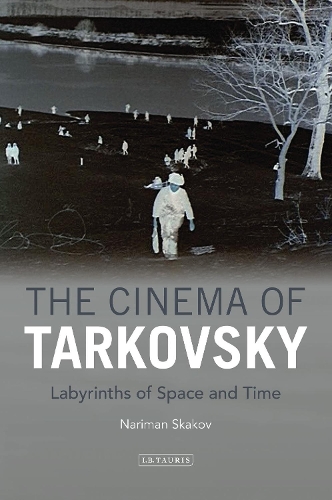
The Cinema of Tarkovsky: Labyrinths of Space and Time
(Paperback)
Publishing Details
The Cinema of Tarkovsky: Labyrinths of Space and Time
By (Author) Nariman Skakov
Bloomsbury Publishing PLC
I.B. Tauris
30th January 2012
United Kingdom
Classifications
Tertiary Education
Non Fiction
791.430233092
Physical Properties
Paperback
280
Width 152mm, Height 232mm, Spine 18mm
420g
Description
The phenomenon of time was a central preoccupation of Tarkovsky throughout his career. His films present visions of time by temporal means - that is, in time. Tarkovsky does not represent time through coherent argument, Nariman Skakov proposes, rather he presents it and the viewer experiences the argument. This book explores the phenomenon of spatio-temporal lapse in Tarkovsky's cinema - from Ivan's Childhood (1962) to Sacrifice (1986). Dreams, visions, mirages, memories, revelations, reveries and delusions are phenomena which present alternative spatio-temporal patterns; they disrupt the linear progression of events and create narrative discontinuity. Each chapter is dedicated to the discussion of one of Tarkovsky's seven feature films and in each, one of these phenomena functions as a refrain. Skakov discusses the influence of the flow of and lapses in space and time on the viewer's perception of the Tarkovskian cinematic universe.
He opens and closes his original and fascinating book on Tarkovsky's cinema by focusing on the phenomenon of time that is discussed extensively by the filmmaker in his main theoretical treatise Sculpting in Time, as well as in a number of interviews and public lectures.
Reviews
'An illuminating long take of the creative work of one of the most enigmatic and thought-provoking filmmakers of the twentieth century. The book sets high standards not only for thinking about Tarkovsky, but for writing about cinema as such. By combining a reflection on the cinematic and the philosophical, this book transforms the boundaries of both.' - Dragan KujundA ic, Professor of Film and Media Studies and Slavic Studies, University of Florida; 'Before this book, Tarkovsky's preoccupation with "sculpting in time" had become a critical cliche. Here Skakov brings it alive again, offering a fresh, theoretically-informed and entirely original approach. He reveals Tarkovsky's work as creating "textural" temporality, offers fresh readings of the key films, and a compelling theoretical framework.' - Emma Widdis, Head of Department of Slavonic Studies, Cambridge University
Author Bio
Nariman Skakov is Assistant Professor of Slavic Languages and Literatures at Stanford University.
